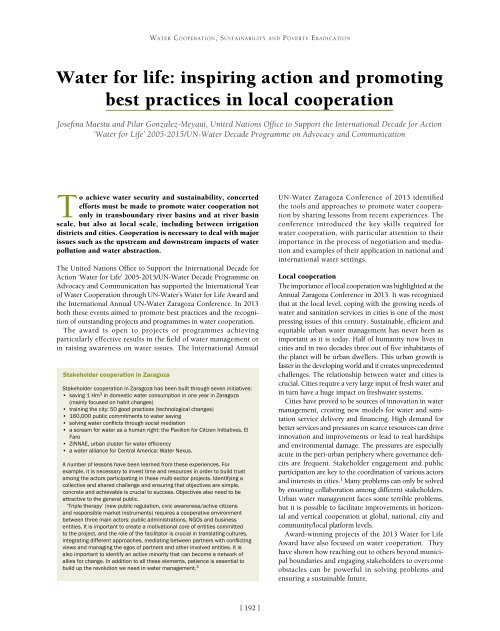Free Flow
oJhBl
oJhBl
You also want an ePaper? Increase the reach of your titles
YUMPU automatically turns print PDFs into web optimized ePapers that Google loves.
Water Cooperation, Sustainability and Poverty Eradication<br />
Water for life: inspiring action and promoting<br />
best practices in local cooperation<br />
Josefina Maestu and Pilar Gonzalez-Meyaui, United Nations Office to Support the International Decade for Action<br />
‘Water for Life’ 2005-2015/UN-Water Decade Programme on Advocacy and Communication<br />
To achieve water security and sustainability, concerted<br />
efforts must be made to promote water cooperation not<br />
only in transboundary river basins and at river basin<br />
scale, but also at local scale, including between irrigation<br />
districts and cities. Cooperation is necessary to deal with major<br />
issues such as the upstream and downstream impacts of water<br />
pollution and water abstraction.<br />
The United Nations Office to Support the International Decade for<br />
Action ‘Water for Life’ 2005-2015/UN-Water Decade Programme on<br />
Advocacy and Communication has supported the International Year<br />
of Water Cooperation through UN-Water’s Water for Life Award and<br />
the International Annual UN-Water Zaragoza Conference. In 2013<br />
both these events aimed to promote best practices and the recognition<br />
of outstanding projects and programmes in water cooperation.<br />
The award is open to projects or programmes achieving<br />
particularly effective results in the field of water management or<br />
in raising awareness on water issues. The International Annual<br />
Stakeholder cooperation in Zaragoza<br />
Stakeholder cooperation in Zaragoza has been built through seven initiatives:<br />
• saving 1 Hm 3 in domestic water consumption in one year in Zaragoza<br />
(mainly focused on habit changes)<br />
• training the city: 50 good practices (technological changes)<br />
• 160,000 public commitments to water saving<br />
• solving water conflicts through social mediation<br />
• a scream for water as a human right: the Pavilion for Citizen Initiatives, El<br />
Faro<br />
• ZINNAE, urban cluster for water efficiency<br />
• a water alliance for Central America: Water Nexus.<br />
A number of lessons have been learned from these experiences. For<br />
example, it is necessary to invest time and resources in order to build trust<br />
among the actors participating in these multi-sector projects. Identifying a<br />
collective and shared challenge and ensuring that objectives are simple,<br />
concrete and achievable is crucial to success. Objectives also need to be<br />
attractive to the general public.<br />
‘Triple therapy’ (new public regulation, civic awareness/active citizens<br />
and responsible market instruments) requires a cooperative environment<br />
between three main actors: public administrations, NGOs and business<br />
entities. It is important to create a motivational core of entities committed<br />
to the project, and the role of the facilitator is crucial in translating cultures,<br />
integrating different approaches, mediating between partners with conflicting<br />
views and managing the egos of partners and other involved entities. It is<br />
also important to identify an active minority that can become a network of<br />
allies for change. In addition to all these elements, patience is essential to<br />
build up the revolution we need in water management. 3<br />
UN-Water Zaragoza Conference of 2013 identified<br />
the tools and approaches to promote water cooperation<br />
by sharing lessons from recent experiences. The<br />
conference introduced the key skills required for<br />
water cooperation, with particular attention to their<br />
importance in the process of negotiation and mediation<br />
and examples of their application in national and<br />
international water settings.<br />
Local cooperation<br />
The importance of local cooperation was highlighted at the<br />
Annual Zaragoza Conference in 2013. It was recognized<br />
that at the local level, coping with the growing needs of<br />
water and sanitation services in cities is one of the most<br />
pressing issues of this century. Sustainable, efficient and<br />
equitable urban water management has never been as<br />
important as it is today. Half of humanity now lives in<br />
cities and in two decades three out of five inhabitants of<br />
the planet will be urban dwellers. This urban growth is<br />
faster in the developing world and it creates unprecedented<br />
challenges. The relationship between water and cities is<br />
crucial. Cities require a very large input of fresh water and<br />
in turn have a huge impact on freshwater systems.<br />
Cities have proved to be sources of innovation in water<br />
management, creating new models for water and sanitation<br />
service delivery and financing. High demand for<br />
better services and pressures on scarce resources can drive<br />
innovation and improvements or lead to real hardships<br />
and environmental damage. The pressures are especially<br />
acute in the peri-urban periphery where governance deficits<br />
are frequent. Stakeholder engagement and public<br />
participation are key to the coordination of various actors<br />
and interests in cities. 1 Many problems can only be solved<br />
by ensuring collaboration among different stakeholders.<br />
Urban water management faces some terrible problems,<br />
but it is possible to facilitate improvements in horizontal<br />
and vertical cooperation at global, national, city and<br />
community/local platform levels.<br />
Award-winning projects of the 2013 Water for Life<br />
Award have also focused on water cooperation. They<br />
have shown how reaching out to others beyond municipal<br />
boundaries and engaging stakeholders to overcome<br />
obstacles can be powerful in solving problems and<br />
ensuring a sustainable future.<br />
[ 192 ]


